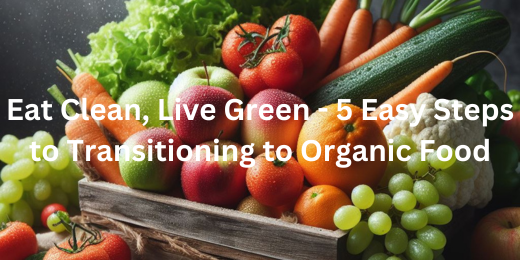
Eat Clean, Live Green – 5 Easy Steps to Transitioning to Organic Food
Transition to organic food
Understanding Organic Food
Transitioning to organic food means making a shift towards consuming produce grown without synthetic pesticides or fertilizers. Understanding organic food is crucial; it refers to food produced through organic farming methods, promoting environmental sustainability and animal welfare. The benefits of organic food include reduced exposure to harmful chemicals and potentially higher nutrient levels.
Making the transition to organic food is important for both personal health and the environment. By opting for organic produce, consumers support sustainable agricultural practices and contribute to reducing pesticide use. Embracing a clean eating lifestyle involves choosing whole, minimally processed foods, which aligns with the principles of organic farming.
Overall, grasping the importance of transitioning to organic food involves recognising its positive impacts on health and the environment. By understanding the definition of organic food and its associated benefits, individuals can make informed choices that promote a clean eating lifestyle and contribute to a more sustainable food system.
Assessing Your Current Diet
When embarking on the journey to transition to organic food, it’s vital to take a close look at your current diet. Begin by identifying processed foods in your meals. These are often high in additives and preservatives, which can be harmful to health. By recognising and reducing consumption of such items, you pave the way for a clean eating lifestyle.
Reading food labels is another essential step in assessing your diet. Pay attention to ingredient lists and nutritional information. This practice helps you understand what goes into the food you consume and enables you to make more informed choices. By scrutinising labels, you gain insight into the quality of the products you’re consuming, aiding in your transition towards healthier, organic options.
Furthermore, evaluating pesticide exposure is crucial for those aiming to embrace organic eating. Certain fruits and vegetables have higher pesticide residues when conventionally grown. By opting for organic versions of these items, you minimise exposure to harmful chemicals. Prioritising organic produce in your diet contributes to a cleaner, greener lifestyle.
Planning Your Transition
When embarking on the journey towards a clean eating lifestyle, it’s essential to plan your transition thoughtfully. Begin by setting realistic goals that align with your dietary preferences and lifestyle. Whether it’s incorporating one organic meal a day or gradually replacing processed foods with whole, organic alternatives, taking small steps can lead to significant changes over time.
Creating a shopping list is another crucial aspect of planning your transition. Before heading to the grocery store, jot down the organic items you need for your meals. This not only helps you stay organised but also ensures that you focus on purchasing nutritious, pesticide-free options. Additionally, consider exploring local markets or farms for fresh, locally-sourced organic produce.
Exploring local organic options can further enrich your transition to a clean eating lifestyle. Many communities offer farmers’ markets or organic food co-ops where you can find a variety of organic products. By supporting local farmers and businesses, you not only gain access to high-quality, fresh produce but also contribute to sustainable agricultural practices in your area.
Making Substitutions
When making substitutions to transition to organic food, start by swapping conventional produce for organic options. This ensures you consume fruits and vegetables free from synthetic pesticides and chemicals.
Choosing organic meat and dairy products also reduces exposure to antibiotics and hormones commonly found in conventional counterparts. Additionally, opt for whole grains and legumes instead of processed grains.
Whole grains provide more nutrients and fibre, promoting better digestion and overall health. Similarly, incorporating legumes such as lentils and beans adds plant-based protein to your diet, supporting a clean eating lifestyle while reducing reliance on animal products.
Embracing Whole Foods
Transition to organic food can significantly enhance your clean eating lifestyle. By incorporating more fruits and vegetables into your diet, you can increase your intake of essential nutrients while reducing exposure to harmful chemicals often found in conventionally grown produce. Exploring plant-based proteins offers a sustainable alternative to animal products, promoting both personal health and environmental well-being.
Cooking from scratch allows you to have full control over the ingredients you use, ensuring that your meals are free from preservatives and artificial additives. This approach not only promotes better health but also enhances the taste and quality of your food. Making the transition to organic food is a gradual process that can lead to long-term benefits for both you and the planet.
Embracing whole foods is more than just a dietary choice; it’s a lifestyle that prioritizes natural, nutrient-dense ingredients. By incorporating more fruits and vegetables and exploring plant-based proteins, you can nourish your body while supporting sustainable agricultural practices. Cooking from scratch empowers you to make informed decisions about what you eat, fostering a deeper connection to your food and its origins.
Sustaining Your Lifestyle Change
Making the switch to a clean eating lifestyle with organic food is a fantastic decision! But remember, any new habit takes a little time. Surround yourself with supportive folks – friends, family, even online communities – who share your passion for clean eating. They’ll be your cheerleaders and offer tips when you need them.
Staying informed is key. Bookmark reliable websites and social media pages that share organic food updates, recipes, and interesting articles. The more you learn about organic produce and its benefits, the more empowered you’ll feel on your journey.
Finally, don’t forget to celebrate your wins! Every milestone, big or small, deserves a pat on the back. Whether it’s finding a fantastic local farmer’s market or mastering a delicious organic recipe, acknowledging your progress keeps you motivated and excited about your clean eating adventure! Purchase high-quality organic products at your local Uyir Organic Farmers Market. You can also buy them online by visiting www.uyironline.in or www.uyirorganic.farm.